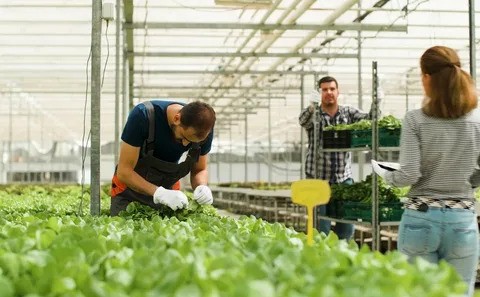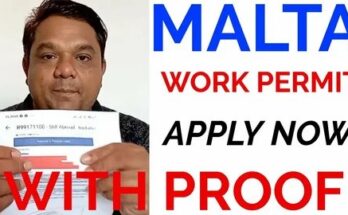Malta Agriculture Jobs
Malta isn’t the first country most people think of when they hear “agriculture jobs.” It’s a small island with limited arable land and a service-heavy economy. That’s exactly why you should take it seriously: the sector is lean, modernizing, and hires selectively—especially for roles that keep yield consistent and compliant with EU food-safety standards. If you want a realistic path into Europe with legal employment, agriculture jobs in Malta (including greenhouse work, horticulture, aquaculture, and logistics) can be a practical route—provided you understand the hiring cycles, the work permit process, and how to pitch your skills.
This guide cuts the fluff. You’ll learn who hires, which roles get visa sponsorship, what salary and overtime pay look like, what documents you really need, how to apply online without being scammed, and how to position yourself for higher-value roles (quality control, irrigation systems, and health & safety). Use the steps below and you’ll avoid most of the mistakes that waste months and money.
Why Malta, and why agriculture?
Packing Jobs in Malta
Factory Jobs in Malta
-
Demand for consistency: Small island, volatile weather, and strict EU compliance create steady demand for reliable greenhouse technicians, pickers, and quality controllers who can hit targets and follow audits.
-
Aquaculture matters: Fish farms (e.g., tuna, sea bream, sea bass) need feed technicians, hatchery assistants, divers, net maintenance, and quality assurance. This side of the sector offers year-round work.
-
Controlled environments are growing: Hydroponics, shade houses, and climate-controlled greenhouses minimize risk, pushing demand for irrigation technicians, fertigation assistants, and sensor/automation support.
-
Lean teams: Fewer layers mean good performers get noticed quickly. If you handle record-keeping, HACCP basics, and EHS (Environment, Health & Safety), you’re already more valuable than a generic picker.
Bottom line: it’s not a massive job market, but it’s real, and it rewards reliability, documentation discipline, and safety compliance.
Core roles hiring now (and how they differ)
-
Greenhouse Worker / Picker / Packer
Tasks: transplanting, pruning, trellising, harvesting, grading, packing, basic pest scouting.
Hiring signal: ability to hit daily quotas, follow SOPs, and keep accurate batch records.
CPC-friendly angle: “agriculture jobs in Malta with accommodation,” “apply online farm worker,” “legal employment contract.” -
Irrigation & Fertigation Assistant
Tasks: drip line checks, nutrient mixing, EC/PH logs, leak fixes, filter changes.
Value add: prevents yield loss; employers prize people who keep water systems efficient.
Keywords: “irrigation technician Malta,” “hydroponic jobs visa sponsorship.” -
Pest & Disease Monitoring (IPM Scout)
Tasks: sticky traps, thresholds, beneficial insects, traceability notes.
Tie-in: supports quality control and audit compliance—a step up from general labor.
Keywords: “HACCP,” “EU food safety standards,” “QA jobs in Malta.” -
Aquaculture Technician / Hatchery Assistant
Tasks: feeding schedules, water quality tests, cage maintenance, net cleaning, sampling.
Safety: strong health insurance expectations given offshore work; ask about PPE and training.
Keywords: “fish farm jobs Malta visa,” “aquaculture technician salary.” -
Warehouse & Cold-Chain Operative (Agri-Logistics)
Tasks: receiving, cold storage, order picking, forklift, last-mile dispatch.
Why it matters: Malta imports/export a lot; cold-chain reliability is money.
Keywords: “logistics jobs Malta,” “warehouse worker contract,” “overtime pay.” -
Quality Assurance (Entry-Level)
Tasks: temperature logs, grading specs, label checks, traceability, audit prep.
Edge: better long-term ceiling, connects to supervisors and exporters.
Keywords: “quality inspector Malta,” “food safety jobs,” “audit compliance.”
Reality check on salaries and benefits
Expect entry-level hourly rates that are fair by local standards but not luxury. Real money comes from:
-
Overtime pay during peak harvests or hatchery cycles.
-
Night/Sunday/holiday rates where applicable.
-
Accommodation provided (huge savings).
-
Transport to site (especially for remote greenhouses or aquaculture cages).
-
Health insurance and protective gear for higher-risk tasks.
Ask for details in writing: base pay, overtime rate, housing terms, transport, paid leave policy, and probation period. Get a legal employment contract before booking flights.
High-intent keywords to include in your job page or post:
“salary per month,” “overtime pay,” “accommodation provided,” “health insurance,” “paid sick leave,” “tax refund,” “social security contributions.”
Work permit and visa sponsorship in Malta (what actually happens)
If you’re not an EU/EEA national, you’ll need employer backing for a Single Permit (combined work permit + residence). The flow usually looks like this:
-
Offer letter from an employer registered locally (farms, cooperatives, aquaculture companies, produce warehouses).
-
Jobsplus labor market check / employer steps (they confirm the role and compliance).
-
Single Permit application with your documents. Expect processing time; don’t plan travel until you have written approvals.
-
Residence card after arrival and biometric steps.
Documents checklist (keep originals and scanned copies):
-
Valid passport (longer than your intended stay).
-
CV/resume matching the role (avoid inflated claims; Malta employers check).
-
Police clearance / criminal record certificate, ideally apostilled/attested depending on origin.
-
Medical check as requested; proof of health insurance (often required).
-
Signed employment contract or offer letter showing salary, duties, hours, accommodation.
-
Proof of qualifications or experience (e.g., forklift license, diver card, HACCP certificate).
-
Passport photos, filled forms, fees for work permit/residence.
Pro tip: If the employer is slow or vague about sponsorship, walk. Real companies know the sequence and will explain work permit fees, processing time, and onboarding dates in plain language.
Seasonality: when hiring spikes
-
Greenhouses/Horticulture: rolling, but peaks before harvest cycles (tomato, cucumber, leafy greens).
-
Aquaculture: year-round core teams; hatchery and grading demand can surge seasonally.
-
Logistics/Cold-Chain: stable with micro-peaks around export windows and holidays.
If you target proactive applications, aim 6–10 weeks before peak cycles. That lines up with interviews and permit steps.
Where to find real vacancies (and avoid fake ones)
-
Direct employer websites
Many farms and aquaculture operators list roles quietly to cut agency fees. Search for: “farm manager Malta jobs,” “greenhouse vacancies Malta,” “aquaculture Malta careers,” “horticulture Malta apply.” -
Jobs portals
Look for postings under “Agriculture,” “Fisheries,” “Manufacturing,” and “Logistics.” Use tight filters: “visa sponsorship,” “full-time,” “immediate start.” Apply through the portal, then follow up by email with your CV and certificates. -
Specialist recruitment agencies
Agencies that place seasonal workers, warehouse operatives, or technicians can be useful. Confirm they are licensed. Never pay a “processing fee” for a job offer. Genuine agencies invoice employers, not candidates. -
Cooperatives and exporters
Producer groups sometimes recruit centrally for packhouses and QA roles. These are strong leads if you like stable hours and SOP-heavy environments.
Red flags:
“Free visa” promises, no physical address, “pay for contract,” or WhatsApp-only “HR” numbers. If it’s too easy, it’s fake.
Step-by-step: how to apply online and actually get hired
1: Target the right role
-
If you’re new: Greenhouse worker, picker/packer, warehouse/cold-chain.
-
If you have a skill: Irrigation, hydroponics, forklift, QA, diving, HACCP.
-
If you can manage people: Team leader roles exist, especially in packhouses.
2: Build a lean, truthful CV (2 pages max)
-
Headline: “Greenhouse Worker | Irrigation & QA Logs | HACCP-Aware.”
-
Bullet points: output numbers (kg/hour, rows/day), tools (drip, EC meter, pruning shears, labelers), software (basic Excel/Google Sheets for logs).
-
Certificates: forklift license, first aid, diving card, HACCP Level 2+.
3: Prep a short cover email
-
4–6 lines: role applied for, your top 3 relevant skills, availability date, visa sponsorship need, contact details.
-
Attach PDF CV and relevant certificates only. No 10MB photo dumps.
4: Apply in two passes
-
Pass A: 10–15 direct employer applications (apply online + email).
-
Pass B: 5–8 licensed agencies with similar roles.
-
Track responses in a spreadsheet: company, contact, date, next action.
Step 5: Interview basics
-
Know the crop/fish species, SOPs, and safety talk (gloves, boots, life vests for aquaculture).
-
Quote real numbers: “I maintained EC 2.2–2.5 in lettuce nutrient solution,” “averaged 18–22 crates/day on tomatoes,” “logged temperature every 2 hours in cold room.”
Step 6: Contract & permit
-
Only proceed once you have: written offer, net pay clarity, accommodation details, overtime rate, shift pattern, probation period, and who pays work permit/health insurance.
-
Keep digital copies. Expect background checks and police clearance.
How to stand out (and justify better pay)
-
Be the person who logs everything: EC/PH, temps, batch numbers, feed times. Managers love traceability.
-
Upskill fast: free or low-cost HACCP, first aid, forklift, basic Excel for QA logs.
-
Safety mindset: mention PPE checks, near-miss reporting, and EHS induction.
-
Language: clear English emails and basic Maltese greetings help on site.
-
Micro-leadership: volunteer to train new joiners on one SOP (e.g., trellising) and you’re on the team leader track.
Costs, accommodation, and taxes—what to ask upfront
-
Accommodation provided: shared rooms are common. Ask for rent amount, utilities, distance to site, and transport timings.
-
Transport: site shuttle vs. public buses; aquaculture often needs early departures.
-
Insurance: confirm medical insurance coverage and what’s excluded. Consider travel insurance for flights and initial weeks.
-
Taxes and social security: ask HR about social security contributions, tax rate, and how to request a tax refund if applicable.
-
Bank account: some employers help open local accounts for salary per month payments; ask HR in advance.
Common mistakes that kill applications
-
Bloated CVs with irrelevant jobs and no numbers.
-
Copy-paste cover letters with wrong company names.
-
No mention of sponsorship—wastes everyone’s time if you need it.
-
Paying “processing fees.” Don’t.
-
Accepting verbal offers. Always request the written contract and permit timeline.
-
Ignoring safety during interviews. Malta employers take PPE and SOPs seriously.
Fast track into better roles: a 6-month plan
Month 1–2: Land greenhouse or warehouse role; hit output targets; keep perfect logs.
3–4: Volunteer for QA checks or irrigation tasks; complete HACCP Level 2; learn label specs.
5–6: Apply internally for team leader or QA assistant; present a mini improvement plan (reduce rejects, tighten cold-room logs). That’s how you move off the lowest pay band.
Sample outreach email (copy, tweak, send)
Subject: Application – Greenhouse Worker (Visa Sponsorship) – [Your Name]
Hello [Hiring Manager Name],
I’m applying for the Greenhouse Worker position. I have 2+ years in greenhouse harvesting and packing, with consistent output (18–22 crates/day on tomatoes), basic IPM scouting, and accurate EC/PH logging. I can start in [X weeks] and will require work visa sponsorship.
Attached are my CV (PDF) and HACCP certificate. I’m available for a video interview this week.
Thank you,
[Full Name] | [Phone] | [Email]
(Adjust for aquaculture or QA.)
High-intent FAQs (for users and search engines)
Is visa sponsorship available for agriculture jobs in Malta?
Yes—employer-led sponsorship via the Single Permit is the standard path for non-EU candidates. Real employers explain the steps, work permit fees, and processing time in writing.
What salary can I expect?
Entry-level roles pay modestly; income improves with overtime, night/Sunday rates, and perks like accommodation and transport. Technicians and QA assistants earn more than general labor.
Do employers provide accommodation?
Some do, especially in remote areas or where shifts start early. Get the rent amount, utilities, room sharing, and house rules in your contract.
What certifications help?
HACCP Level 2+, first aid, forklift, basic Excel for QA logs, and for aquaculture, valid diving certifications (where applicable). These move you up the ladder faster.
How long does the work permit take?
Expect formal timelines and staged approvals. If an employer refuses to discuss the permit process or asks you to pay “processing fees,” walk away.
Can I switch employers later?
Possible, but regulated. Ask HR about contract terms, notice period, and any conditions tied to your work permit.
Final reality check (so you don’t get burned)
Malta doesn’t hand out “free visas,” and it doesn’t pay tech-sector money for entry-level farm work. But it does reward people who show up, follow SOPs, and keep excellent records. If you can combine basic field skills with quality control, irrigation know-how, or cold-chain discipline, you’ll get a legitimate contract, steady overtime, and the kind of references that open doors across EU agriculture and food logistics.
If a “recruiter” asks you for money to issue an offer letter, you’re not being recruited—you’re being targeted. Stick to licensed channels, apply online, demand written terms, and keep your documents tight (police clearance, medical, health insurance, apostille/attestation where needed). That’s how you convert applications into a plane ticket and a real job.



